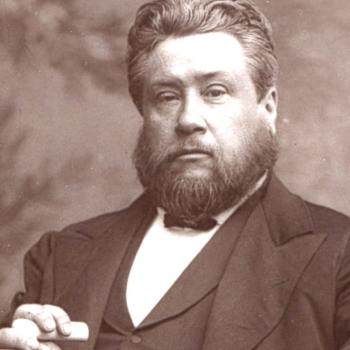Last week, as you may know, I preached on Jacob. During my preparation I was, not surprisingly, taken once more to the glorious doctrines of grace—the so-called “TULIP.” Jacob is used in Romans as a supreme example of God’s free grace.
This post is part of a mini-series highlighting quotes from others on each of these five points of Calvinism. It will also provide links to some old posts I wrote on Calvinism. We began the series with a quote that claims the doctrine of total depravity helps your marriage.
To some degree the doctrines of grace, or rather one aspect of them, Unconditional Election, came up in my sermon last week (although I didn’t use the words). One quote I have been meaning to share with you, but the baptism debate got in the way, has been the following from Simeon, whose works are now available from Logos Bible Software.
Like Spurgeon and myself, Simeon is adamant that there is no such thing as what some call “double-predestination.” Thus, people are wholly to blame for their own damnation, while God is wholly credited with saving us. God does not foreordain that some go to hell in the same way he foreordains that some will be saved. This might sound illogical, but it is, I believe, biblical and a great mystery we cannot fully fathom.
Charles Simeon puts it like this in a quote that should whet your appetite for the rest of his works, which are proving to me to be as useful as Spurgeon’s:
“If, as the Apostle says, ‘there is a remnant according to the election of grace,’ we are ready to suppose that those who are not of that number are not accountable for their sins, and that their final ruin is to be imputed rather to God’s decrees than to their own fault. But this is a perversion of the doctrine. It is a consequence which our proud reason is prone to draw from the decrees of God: but it is a consequence which the inspired volume totally disavows. There is not in the whole sacred writings one single word that fairly admits of such a construction. The glory of man’s salvation is invariably ascribed to the free, the sovereign, the efficacious grace of God: but the condemnation of men is invariably charged upon their own wilful sins and obstinate impenitence. If, because we know not how to reconcile these things, men will controvert and deny them, we shall content ourselves with the answer which St. Paul himself made to all such cavillers and objectors; ‘Nay but, O man, who art thou that repliest against God?’ And if neither the truth nor the authority of God will awe them into submission, we can only say with the fore-mentioned apostle, ‘If any man be ignorant, let him be ignorant.’ As for those, if such are to be found, who acknowledge the sovereignty of God, and take occasion from it to live in sin, we would warn them with all possible earnestness to cease from their fatal delusions. In comparison of such characters, the people who deny the sovereignty of God are innocent. We believe there are many persons in other respects excellent, who, from not being able to separate the idea of absolute reprobation from the doctrine of unconditional election, are led to reject both together: but what excellence can he have, who ‘turns the very grace of God into licentiousness,’ and ‘continues in sin that grace may abound?’ A man that can justify such a procedure, is beyond the reach of argument: we must leave him, as St. Paul does, with that awful warning, ‘His damnation is just.'”
Simeon, Charles: Horae Homileticae Vol. 1: Genesis to Leviticus. London, 1832-63, S. 210












